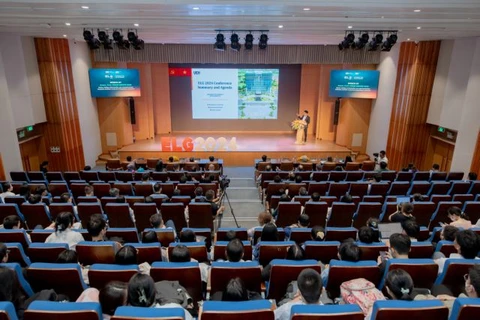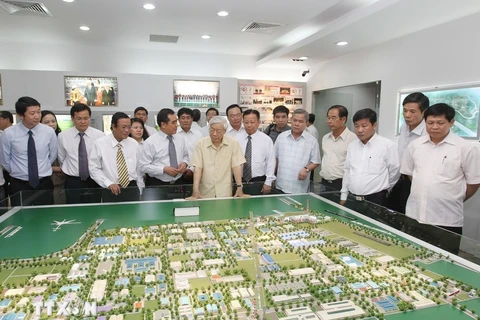
Hanoi (VNA) - Dual transition is an inevitable trend that the Vietnamese business community needs to grasp in the coming years, participants heard at the annual conference on sustainable development held by the Dau Tu (Vietnam Investment Review - VIR) Newspaper on November 12.
Addressing the event, themed 'Taking the lead in dual transition for a greener Vietnam', VIR Editor-in-Chief Le Trong Minh said that promoting green growth through digital transformation has brought the country a special opportunity to achieve sustainable development, increase labour productivity and improve people's quality of life.
However, to achieve the expected results, the business community - one of the key players in this process - needs to have right awareness of its responsibilities, while also taking the lead in driving innovation and creativity, Minh stated.
Emphasising the urgency of dual transition, Deputy Minister of Planning and Investment Do Thanh Trung shared that Vietnam has implemented several important strategies on green growth and climate change response and achieved encouraging results. However, digital transformation and green transition occur separately and have yet to have their potential fully tapped.
Trung cited the World Bank's 2023 Report on the Dual Transformation trend as saying that in the 2017 – 2021 period, Vietnam held 15% of the total 493 green patents in the emerging market, ranked behind Malaysia (51%) and Thailand (20%). Most of Vietnam's patents relate to fields such as wind energy, waste management, air and water pollution reduction and green construction.

Meanwhile, in terms of digital transformation technologies, Vietnam only owned 8% of the total 537 patents of developing economies, behind Malaysia (58%), the Philippines (16%) and Thailand (11%). The report shows that digital transformation is an important driving force to promote the success of green transformation and the 'dual' transition trend.
During the event, participants also heard speakers share experiences and successful lessons on green growth and sustainable development.
New Zealand's Consul-General and Trade Commissioner to Vietnam Scott James shared that his country took sustainability seriously and its commitment to preserving the natural environment was embedded in both policies and practices.
“New Zealand actively supports our businesses to make sustainability a core part of their export strategy and a point of difference in global markets. This is especially important as more than 85% of New Zealand’s exports are going to countries with (ESG) Environmental, Social and Governance legislation in place or coming into force that require businesses to report on sustainability practices," he said.

He added that New Zealand has committed to achieving net-zero carbon emissions by 2050. By investing in research and technology, the country is working toward more efficient, lower-emission farming practices that balance productivity with environmental responsibility.
“Our dedication to renewable energy is another area where New Zealand demonstrates its commitment to sustainability. Around 80% of New Zealand’s electricity already comes from renewable sources and we aim to increase this share to 100% by 2030,” said James.
Nguyen Thi Ngoc Hue, General Director of Strategic Human Resources Management, External Communications and Sustainable Development at AEON Vietnam, said that human sustainability was one of the three main pillars of its sustainable development strategy.
“Placing human resources in the role of attaching values and promoting innovation and creativity has brought remarkable results to AEON Vietnam. The harmony between personal goals and corporate culture is the factor that helps each AEON employee feel like they want to bond and contribute more to the company, thereby improving labour efficiency and ensuring the stable operation of the business.
“At AEON Vietnam, we always uphold human values and consider human resources development as the key to the business's sustainable success,” said Hue./.






















